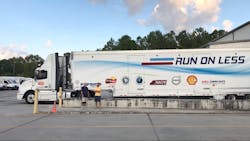When we think of fuel efficiency we tend to look at things that will help late model trucks get the most miles from a gallon of fuel.
And while it’s true that today’s newer trucks with their aerodynamic tractors and finely tuned powertrains are prime candidates for add-on technologies don’t discount the fuel savings that can be achieved with older trucks.
During Run on Less, we focused on newer trucks — 2015 model year and newer — but I also spent some time chatting with two hyper-MPG drivers: Steve Kron, who drives a 15-year-old International truck and Alec Costerus who drives a 2011 Volvo.
Alec says having the right information is instrumental to his success especially when it comes to knowing the weight of the load. He focuses much of his attention on closing the gap between the tractor and trailer doing all he can to make the gap “disappear.” He also has side skirts that extend from the landing gear to the rear tandems.
He keenly focuses on his own driving habits as well and seeks feedback on his shifting patterns, etc. While he always achieves high MPGs he is a strong believer in driver coaching tools saying that we all can improve no matter how good we think we are.
He also says it is helpful to share inform with others to both learn from them and to teach them as well.
Steve will tell you about his appetite for all things aerodynamic. He’s so passionate about it that he invented his own back draft device — think trailer tail— for the back of his trailer. He also removes (and relocates) anything that hangs off the truck like grab handles and license plates because of their negative impact on MPG.
While this may seem strange, Steve says he likes driving in the rain because the way the rain causes the dust and mud to cake on certain areas of the truck allows him to see areas of high turbulence and come up with solutions to mitigate their effects on fuel efficiency.
These guys are just two examples of drivers with older vehicles who don't get the advantage of the higher efficiency powertrains on today’s newer trucks, but still manage to put up impressive fuel economy numbers.
And they both will tell you, getting great MPG does not happen overnight. It is an ongoing process with incremental changes that add up to big savings. As Alec says, “Achieving great fuel economy is a matter of inches. To get double-digit fuel economy, you must pay attention to even the minutest of details.”
Alec and Steve have demonstrated their passion for fuel economy and don’t let the fact that they drive older trucks stop them from regularly hitting 10 MPGs. You shouldn’t use age as an excuse either.
About the Author

Michael Roeth
Executive Director
Michael Roeth is the executive director of the North American Council for Freight Efficiency. He serves on the second National Academy of Sciences Committee on Technologies and Approaches for Reducing the Fuel Consumption of Medium and Heavy-Duty Vehicles and has held various positions with Navistar and Behr/Cummins.
